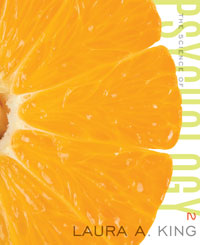1 A) physiological changes in the body create emotion. B) emotions and physiological reactions occur simultaneously. C) the body is prewired to maintain homeostasis. D) performance is best when there is a moderate amount of arousal. 2 A) drive; need B) need; drive C) instinct; motivation D) motivation; instinct 3 A) Glucose B) Leptin C) Insulin D) Serotonin 4 A) bulimia nervosa. B) anorexia nervosa. C) weight cycling. D) obesity. 5 A) Individuals with bulimia nervosa are within a normal weight range. B) Anorexia nervosa is not associated with high self-standards. C) Bulimia nervosa is more severe than anorexia nervosa. D) Anorexia nervosa is characterized by preoccupation with food, whereas bulimia nervosa is not. 6 A) self-actualization B) shelter C) self-esteem D) sex 7 A) relatedness. B) competence. C) generativity. D) autonomy. 8 A) being a good person B) becoming a successful lawyer C) running 3.5 miles twice a week for the next two weeks D) losing weight 9 affect refers toA) actively pursuing your goals. B) emotion. C) the opposite of cause . D) drives. 10 A) hippocampus B) reticular formation C) amygdala D) the occipital lobe 11 A) Physiological arousal can be interpreted in different ways, resulting in different emotions. B) Physiological arousal and emotion happen simultaneously. C) Physiological arousal happens first; emotion then follows. D) Emotion happens first; physiological arousal then follows. 12 A) Emotions come before thoughts. B) Thoughts come before emotions. C) Thoughts come before physiological arousal. D) Some emotions occur first, followed by thoughts; some thoughts occur first, followed by emotions. 13 A) James-Lange theory B) Cannon-Bard theory C) two-factor theory D) cognitive theory 14 A) the facial feedback hypothesis. B) display rules. C) the wheel model. D) culture-bound syndromes. 15 A) emotions can be classified as positive affect or negative affect. B) physiological arousal can be cognitively misinterpreted. C) women are better than men at interpreting emotion. D) emotions vary in intensity. 16 A) coping. B) positive affect. C) stress appraisal. D) resilience. 17 A) reproduction. B) drive reduction. C) self-actualization. D) homeostasis. 18 A) ventromedial hypothalamus B) lateral hypothalamus C) hippocampus D) amygdala 19 A) fear and surprise. B) happiness and surprise. C) fear and anger. D) happiness and anger. 20 A) getting more exercise. B) help other people. C) identify and commit to his personal goals. D) spend more time at work.





